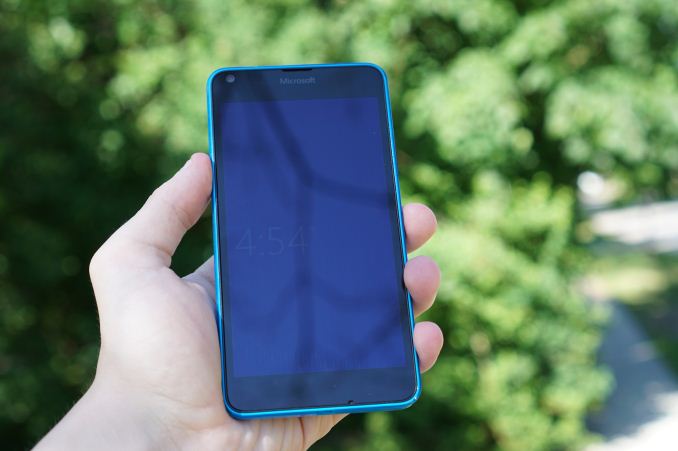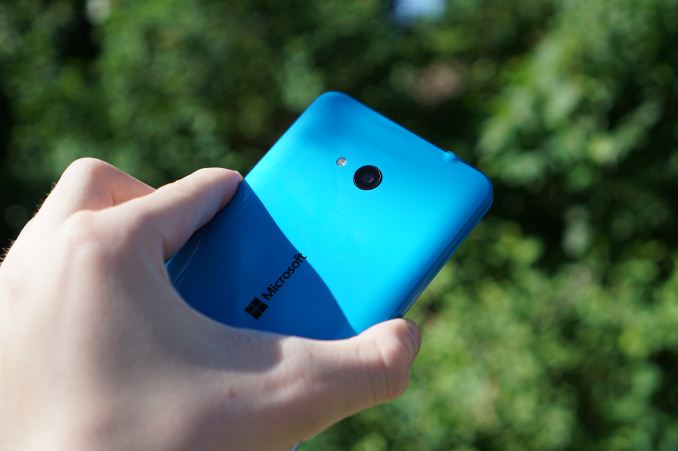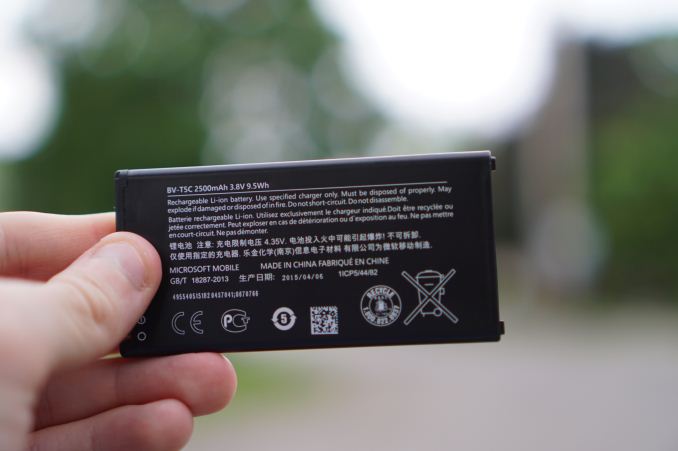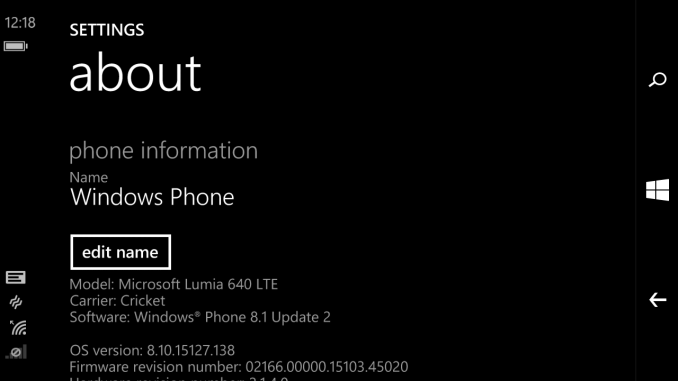The Microsoft Lumia 640 Review
by Brandon Chester on June 9, 2015 8:00 AM EST- Posted in
- Smartphones
- Microsoft
- Mobile
- Lumia
- windows phone 8
Final Words
It's honestly impossible for me to form a single opinion of the Lumia 640. I'm thankful that we don't operate using some sort of rating system where I would have to. Smartphones are comprised of many parts, both hardware and software, and all these things come together and provide an experience. Because smartphones are so appliance like, there's really no way to separate a device's hardware from its software. They need to be evaluated as a whole, and that's why coming to conclusions the Lumia 640 becomes such a difficult task. At the same time, different people value different things in a smartphone. Whether or not it will provide a good experience for you depends on the parts of a smartphone you care about most, and the parts that you're willing to accept compromises on. Because of this. it's worth breaking the Lumia 640 down to its individual parts to see what areas it excels in, and where it falls short.
For me, the best feature of the Lumia 640 is definitely its display. When Brett found that the Lumia 630 shipped with a very accurate LCD in his review, I assumed it had to be some kind of fluke. While we've certainly seen improvement to display accuracy across every price point, the 630 was as accurate as high end flagship devices. However, the Lumia 640 makes it clear to me that people at Nokia, and now at Microsoft, care about having high quality displays on their phones. The greyscale and color accuracy is amazing, and while the pixel density isn't off the charts, it's still much sharper than competing devices with qHD displays.
The Lumia 640's build quality is also something that I think stands out from the competition. Holding it in one hand with the Moto E in the other, it's clear that both are very well made devices for their price. What sets the Lumia 640 ahead is the solid and seamless design of the back cover. There are no lines or tabs that make it obvious that the back cover is removable, and I didn't even realize it myself for a short time. The glossy coating is definitely not my preference, but it goes well with the bright and colorful design of the back covers.
Camera quality has always been a focus with Lumia devices, and I don't think the Lumia 640 is an exception. The 1/4" 8MP camera is by far the best I've used on a device at this price range, and it's clear that much of this comes from the high quality post-processing that Microsoft is doing. There are so many devices that have great camera sensors but completely fail because of poor processing, and Nokia has managed to take a much lesser sensor and produce great photos.
As for the camera app itself, I am only a fan as far as the auto mode is concerned. The interface for manual controls needs work, and the implementation of shutter and ISO control is not useful at all because you can't see a preview of the changes you're making. It's almost like shooting on film, where you just have to pray that the photo turns out well. Most users will stick to the auto shooting mode anyway, but Microsoft should really fix the issues with the manual mode if they intend to offer it.
Unfortunately, the Lumia 640 isn't without its issues. Performance is definitely the first problem that comes to mind. Snapdragon 400 is really starting to show its age, and there are many performance issues that are rooted in software. Internet Explorer is simply not a fast browser, and it's immediately obvious once you try browsing the web with it. Microsoft's scroll speed cap also makes the entire operating system feel slow, and you eventually get to a point where you don't even want to use your phone because the simple task of navigating somewhere takes forever. Some areas like Action Center are also prone to stuttering and sluggish scrolling, which looks very out of place when the rest of the OS is so smooth.
Battery life is also a bit of an issue. It's certainly not bad, but it's not near as good as other devices at this price point like the Moto E. Windows Phone definitely inherited some idle battery life problems during the move from Windows CE to Windows NT, and those were very apparent during my testing as well. Despite the fact that the Lumia 640 was operating without a SIM card, the battery was always low by the early evening even when I hadn't been using it that much.
The last part of the Lumia 640's experience is the software. This is the part that I'm the most conflicted about. When you just consider features, it's clear that Windows Phone has matured significantly from its earliest iterations. Notifications are no longer an issue, and the interface has been refined with the addition of new tile sizes, more space for tiles, and folders. For the average user, the core OS has all the things they'll need from it. At the same time, the OS feels extremely slow, and there isn't anything about it that really stands out from iOS and Android.
Feature parity is fine, but you have to have parity in every respect, including third party applications. In that regard, I wasn't able to make Windows Phone work for me. The apps that do exist are mediocre and trail behind their Android and iOS counterparts on performance, quality and features. The apps that don't exist are the what really ruined things for me though, particularly the lack of Google apps. While I could switch from Drive, it would require a lot of files to be moved over. Hangouts is impossible to switch from, because it involves convincing everyone you speak to using it to switch from it as well. In the end, there are just too many key services that are inaccessible to me on Windows Phone.
In the end, I feel like the Lumia 640 is a great device as far as hardware is concerned, but for me it was let down by its software. I'm sure there are people who won't have the trouble with third party apps that I did, but I'm confident that there are a lot more people who will. Anyone who is thinking about switching over to Windows Phone should definitely take a look at the Windows Store to see if their favorite apps are available. Trying them out on a real device is also useful to check the quality of apps. If you're a user who is fine with Windows Phone and its app selection, then I think you'll enjoy the Lumia 640. It's a really great device for the price, and it's unfortunate that in my case there were just too many missing apps to make the Lumia 640 work for me.














130 Comments
View All Comments
anomalydesign - Tuesday, June 9, 2015 - link
I agree with pretty much all of the assessment of the Windows phone ecosystem in this article. Aside from users looking for a low end smartphone, there is one other group I consistently recommend windows phones for; first time smart phone users, especially those who are technology averse.I've found the Windows phone interface is the easiest to pick up and start using with minimal foreknowledge. Beyond that, it requires the least maintenance over the long run (android trends to get bogged down/buggy if you don't stay on top of it, plus between Google, the manufacturer and the carrier, users end up with things like 3 different apps for looking at photos, or using Facebook. ios is more polished and consistent, but has a lot of Apple ecosystem "features" which deeply confuse people who don't already have (or understand) feature of Apple accounts like the iCloud or iTunes. The backup features especially seem to confuse people.
The lack of apps and Google services is a problem, but less so when you consider the phone for a group that is behind the curve. If someone is more active on pinterest, hangouts, etc, then a different phone would work better. But for the group I recommend this phone for, if they do have any accounts set up, they tend to be with Skype or Hotmail, either of which is all you need to get the phone going. This group is also likely to appreciate things like a decent camera and good build quality much more than gpu performance.
That's not a good market for Windows Mobile long-term, as first time smartphone users are a dwindling segment. But as of now, I'm very glad to be able to suggest out as an option.
Daniel Egger - Tuesday, June 9, 2015 - link
And I disagree. While the ecosystem really is not that good there's one *huge* advantage to WP 8.1 which is often forgotten: it provides exquisite worldwide offline navigation, public transport information and a number of high quality applications out-of-the-box and there's no crapware which cannot be uninstalled unlike on Android devices.For me the absence of the Google spyware is actually a big plus instead of a negative especially since it is close to impossible to run an Android device without Play Store. Also in favour for WP is the fact that business necessities (mail, calendar, notes, contacts) work much better out of the box than on Android, not quite as good as on iOS but for a fraction of the price; it's actually quite amazing which hoops one has to hop through to get CalDAV and CardDAV running (with DAVdroid and CAdroid) only to be greeted all the time with the warning that someone might be spying on you while at the same time Google is leeching personal information and sending it to its own servers...
pSupaNova - Tuesday, June 9, 2015 - link
"For me the absence of the Google spyware is actually a big plus instead of a negative especially since it is close to impossible to run an Android device without Play Store"Google Spyware the Intelligent ware that help you to collate information, plan journeys and make your life much easier.
Microsoft lost in the smartphone arena because their offering was too late and that tile interface to alien for users and the fact that they locked down their OS.
If you notice smartphone's are starting to be digital assistants to excel at this function they will have to know information about you, my bet is that users will trade 'spyware' privacy for the benefits ever increasing A.I (smarts) brings to them.
Daniel Egger - Tuesday, June 9, 2015 - link
"Google Spyware the Intelligent ware that help you to collate information, plan journeys and make your life much easier."Right. I have not found a single thing in Google that made my life easier compared to alternate offerings, privacy issues not even considered. For instance when it comes to journeys WP provides a much better service especially when taking the offline mode into account; Here Maps (WP only version) is quick and constantly updated and already has plenty of POIs built it plus it is very useful to pin tiles with important destinations for quick access to important destinations, Drive has outstanding routing capabilities, accurate traffic information (when online) and a very useful energy saving and driver friendly mode, Transit (and public transport planning in the other apps) works astonishingly well all around the globe and provides accurate pedestrian/public transport planning (especially when online it will also have and use current departure times to provide the best alternatives), City Lens is extremly useful to find nice places around you.
"If you notice smartphone's are starting to be digital assistants to excel at this function they will have to know information about you,"
B.S. I've used smartphones back in the times when the term smartphone wasn't even coined (they were called PDAs back then). The most important point is good synching capabilities (Android only syncs well with Googles' own services which are pretty much useless for professional and/or privacy concerned use) followed by applications with outstanding usability and both leave a lot to be desired out-of-the-box in Android -- funny enough the replacement application which Asus ships with their devices have much better usability than the Google built-ins.
pSupaNova - Tuesday, June 9, 2015 - link
Google's services offer a seamless fit across device types I like that I can order to go out for dinner on the desktop and get my calendar updated on my phone. That I Google Now knows my habits and will tell me if their are problems getting home from work.Your trying to make out as Nokia Maps is a killer feature which you can download on Android if you wanted anyway.
The advantages of Live traffic updates far out way using a Sat Nav on offline mode we our living in a ever connected world get with the program.
Android is the Windows of the smartphone world. Its more open has lots of hardware, highly configurable in both hardware and software.
" funny enough the replacement application which Asus ships with their devices have much better usability than the Google built-ins." - yes Google Android platform allows others to innovate.....
Daniel Egger - Tuesday, June 9, 2015 - link
"Google's services offer a seamless fit across device types I like that I can order to go out for dinner on the desktop and get my calendar updated on my phone."Yes, that's called syncing. And Android devices are horrible syncers when services other than Google should (or need to) be used. That's a clear no-go for corporate and privacy concerned uses.
"Your trying to make out as Nokia Maps is a killer feature which you can download on Android if you wanted anyway."
No you can't. Here Maps on Android and iOS is a incomplete and halfassed solution requiring sign-up.
"The advantages of Live traffic updates far out way using a Sat Nav on offline mode we our living in a ever connected world get with the program."
No, it doesn't. Here Maps has exceptionally good live traffic updates when online. But you're obviously not coming around a lot if you don't see a problem streaming maps around the globe. Roaming charges can be horrific...
"Android is the Windows of the smartphone world. Its more open has lots of hardware, highly configurable in both hardware and software."
Again B.S., there're very few Android devices which work nicely out-of-the-box. Most of the devices are bloatware ridden and thus provide an inferior experience and abysmal battery life and often they're already dead right from the factory as they'll rarely see any updates which is a must due to the terrifying amount of security problems. There're only few exceptions mostly provided by Google itself and manufacturers for Google like Motorola, Samsung and Asus; but thanks to Intel even the custom rom approach is somewhat thwarted in certain price regions...
I've yet to see an Android device providing an enjoyable experience and acceptable battery life without wasting much time with tinkering. My Moto E (2nd gen) became pretty much usable after installing an unofficial CM12.1 ROM and freezing of all Google services -- over 9 days of battery life are more than okay nowadays, previously with (almost stock Android) Motorola software (both Kitkat and Lollipop) the battery was dead after no more than 2,5 days.
I do have plenty of other Android devices at my disposal if you need more input.
WP devices on the other hand do not require any tinkering and yet offer a much better general experience and battery life as well as nice apps without paying through your nose with your personal data.
iPhones do, too, however those are obscenely expensive compared to WP phones without providing any massive benefits worth the markup.
pSupaNova - Wednesday, June 10, 2015 - link
I have an Sony Xperia Z3 Compact & the battery life and out of the box experience are brilliant.I have not had to install a Custom Rom for years, that's for people with too much time on their hands.
if you want dumb phone battery life then why are you buying a Smartphone?
Windows Phone is so trash that you can't even browse the files on the system when you plug it into your PC.
With windows phone its hard to get it talking with your smart TV or NAS.
File Managers are also a joke. I tried windows phone 7 and saw how Microsoft thought they could lock you down like Apple and knew instantly that they would lose to Android.
Android is fine at synching to other services I have use yahoo mail, EverNote & OneNote with no problems also I have my photos from my phone camera and whatsapp automatically sync with both Amazon & Google Photos so I never lose a photo, I think you are spreading lies.
Windows Phone will never catch up to Android because it's has not Got the developers or consumers mindshare and this is coming from some-one with over two decades of professional Windows Development experience.
Windows Tablets on the overhand do have a chance.
jakoh - Thursday, June 11, 2015 - link
WP7, lol, was terrible. Its like saying i hate android because of android 2.3 (which was still pretty popular a couple of years ago.BTW, there is a files app on WP8.
jakoh - Thursday, June 11, 2015 - link
If its worth anything "exquisite worldwide offline navigation" is now available on android and IOS, Here Maps.I like to mention that I would switch to Android, if I can select the apps that run in the background (please dont offer killing apps). Also Google on Tap should be offered as something parents would get to put on their childrens phone.
Alexvrb - Tuesday, June 9, 2015 - link
If you lock yourself into somethng that is platform-limited like Hangouts or even worse iStuff that's not MS' fault. Skype and FB Messenger for example run on just about everything. Same with Kindle, Dropbox, most MS services, etc. I tend to avoid services that don't have broad platform support. It's just retarded to say "Oh I can't buy or recommend that phone because I let myself become dependent on some proprietary lockware".